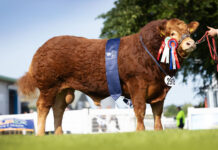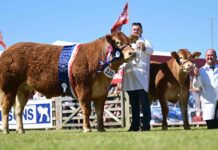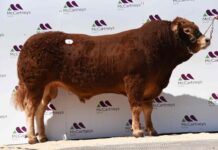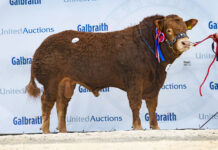PRESS RELEASE November 2014
New BASCO Chairman Announced
Introduction to BASCO
 A number of breed societies decided to cooperate when replacing their existing databases for pedigree registration and herd book administration. This led to the formation of a company called BASCO that these founding societies use as a holding company, thereby allowing the individual founder members to continue servicing their members as autonomous independent organisations promoting their respective breeds. The rest, as they say, is history.
A number of breed societies decided to cooperate when replacing their existing databases for pedigree registration and herd book administration. This led to the formation of a company called BASCO that these founding societies use as a holding company, thereby allowing the individual founder members to continue servicing their members as autonomous independent organisations promoting their respective breeds. The rest, as they say, is history.
Or is it? Perhaps the best is yet to come. Following the award of a major grant from the Agricultural Development Scheme (ADS) provided by Defra, developments in the original database to incorporate health and fertility traits, the joining of BASCO by Signet and the genetic evaluations being undertaken in Edinburgh by SAC have all been initiated; this being the start of a development program that will lead to a major breeding and performance recording company operating in the UK for UK farmers, using UK parameters for evaluation and most importantly, owned and controlled by UK farmers.
What will this mean to UK producers? This article sets out the benefits of this co-operative venture and explores where this process will lead. It finishes off with a plan of action to be implemented by BASCO over the next 5 years.
BASCO
The holding company is simply a vehicle by which the participants can organise themselves and divide the cost and benefits of cooperative action in an organised and equitable manner. BASCO currently employs nobody and subcontracts all its activity out. It is run by a Board of Directors drawn from the founder members. It may be thought of as a brand name.
OBJECTIVES
The company’s objectives are to profitably run the business of storing a wide range of relevant animal data on an easy to use web-based database, developing the database to suit future anticipated needs and managing that whole process. Its surpluses are currently deployed in developing the database to enable each founder member to increasingly provide a wider range of services and products to its respective customer base. The company business model is based on making a small financial surplus from the transaction charges made to each of its founder members and to extending its services to other customers.
BASCO has no intention of replacing the activity of its founder members in breed promotion and development. Its intention is to undertake that part of breed society work that is most profitably shared such as database maintenance.
COOPERATIVE ACTIVITY
BASCO’s belief is that Breed Societies will come under progressively greater pressure as the inevitable increase in recording required by legislation and quality assurance places a burden on farmers that could displace registrations. In effect, Societies will be better placed to resist that pressure if they can become more relevant to their members by providing a wider range of services and by increasing the value to their members of the information they collect. They have chosen to co-operate with each other and with other organisations, such as Signet, NSP and BCMS to bring that about. The reduced cost of service development cooperatively and the bringing together of disparate data sources (e.g. Pedigree and performance data from breed societies and Signet respectively) to provide a service that is greater than the sum of its parts will ensure that success.
DATABASE
The database has been developed by Scotland ‘s biggest software house, Graham Technology. They employ a Java based software product that allows the program to be built from subcomponents and to re-use business rules already established. The data is stored in an Oracle database on a SUN server. All this means it is leading edge technology using Industry standard protocols on a scaleable database. Its future is assured.
It is accessed over the internet so that all users (office staff and farmers alike) use the same program and look at the same data. It is fast enough to be very usable even over a normal dial up internet connection. Over Broadband it is extremely fast.
PERFORMANCE RECORDING & SIGNET
Signet has joined forces with BASCO to create and use a single data source for all performance and pedigree recording. All animal data from any breed that is collected by Signet will be stored on the BASCO database. Obviously, animals already entered on the database by pedigree breeders will be used by Signet when performance records for these animals are generated. This will reduce costs considerably allowing for greater emphasis on development of novel services by both BASCO and Signet.
A further benefit of a single data source for all animals will be that farmers themselves could enter data directly on to the database if they so wish. Those without the time or inclination to use computers can still use Signet or BASCO members to input the data for them
HEALTH DATA
A number of structural changes to support mechanisms, increasing requirements for quality assurance, interest from consumers (supermarkets) in the methods of food production and costs associated with treating animals have led to the development of management systems and breeds that are categorised as ‘Easycare’ in sheep and low cost maintenance in beef. In short the market wants meat that is produced with less veterinary treatments, is produced in a welfare friendly fashion and has records to support this. Farmers want to produce meat profitably and with less human intervention since this equates to cost. There is an obvious balance required between farmers’ needs and market needs in terms of welfare.
To enable its members to respond to this change to market requirements and lead in satisfying sheep and beef supply into this market, BASCO is currently adding further health recording facilities to its database.
The benefit of this will be twofold at least
- records will be available to members for management purposes
- the system will aid in quality assurance to prospective buyers
- records can be used to produce EBV’s for subsequent selection
The system will contain diseases already coded and grouped into logical groups e.g. feet problems, udder problems and will contain an extensive list of treatments with their respective codes. This will ensure that all records are comparable since they will be coded correctly and will also reduce the need for data input by breeders.
FERTILITY RECORDING
Obviously, in all breeding programs recording of inseminations or natural matings is paramount to success. These records are usually made and held on farm and seldom find their way into single national databases. The BASCO database is being enhanced to enable farmers to record fertility data in a way that encourages recording. Generally in dairy herds, animals are artificially inseminated individually. However, in beef and sheep matings are mostly natural with a bull or ram running with a number of animals. Therefore, the fertility recording process will allow for animals to be allocated to groups and a sire allocated to that group for a period of time. Subsequent confirmation of pregnancy will cause a fertility record to be created.
The availability of these records will enable farmers to manage their animals more effectively and also to identify females that are performing poorly in terms of reproduction. A further major benefit will be that fertility indices could be calculated from the raw records, thereby identifying males of superior fertility and families of females that could better be bred from.
The system will contain a master list of health events and a master list of treatments. Users will select those they most often use and these will be presented to users by default thereby reducing the need to scroll through a list containing many entries that are not used by the farmer. Of course, the farmer can add and delete from the ‘local list’ without affecting the master list used by all farmers.
NOVEL TRAITS
The availability of a state-of-the-art web based database will enable and encourage the recording of a wider range of traits on more animals. A complete list of those traits is not yet known since nobody knows what might be important to buyers in the future. However, a number of traits have aroused interest and are currently being investigated for their heritability and ease of recording. A good example is calf and lamb vigour at birth and another example is meat eating quality (see below).
Market demand may also include demands made by legislation such as those relating to environmental impact and other social requirements such as those relating to animal welfare. The BASCO database will keep up with changing demands and will anticipate recording requirements ahead of time thereby providing its members with proactive tools with which to react.
SUPERMARKETS AND MARKETS REQUIREMENTS
The value of the red meat sector is around £9 billion at retail value and the benefit of objective genetic improvement in this sector, at its current modest level of uptake, is calculated to be worth a total of £14 million per year. The amount of value added to a breeder’s flock or herd is dependent on the correct choice of sires and then mating those sires to the appropriate dams. The resulting offspring contain the breeders profit presuming that the animals are demanded by the market. The ultimate aim of BASCO founder members is to assist its members in achieving this increased profit by providing relevant information to facilitate the correct breeding decisions being made.
PROMOTING PERFORMANCE RECORDING
A sub-objective of the promotion of genetic indices is to bring about an increase in the number of farmers participating in performance recording. This will have a number of spin-off benefits such as an improvement in the cohesion of producers to a common goal known to have quantifiable benefits. It also provides more accurate EBV’s to all breeders which in turn increases confidence in indices leading in turn to an increase in their uptake. At present, performance recording in the sheep sector is low (around 5% of Breed Society members) and only marginally higher in beef (around 10% of Limousin Society members). The objective is to double the number of performance recorded flocks and herds by the end of three years.
CUSTOMISED HERD/FLOCK INDICES
The ability to have results customised to match farmers breeding programmes will be of benefit to many producers as they will be able to rank and select animals in their herd based on their own criteria. This provides the opportunity to make improvements in specific traits pertinent to the farms’ economic and physical circumstances. Recent experience from Australia suggests that the availability of a customisation process will lead to an increase in the penetration of indices into livestock production systems partly as a result of the index being considered more appropriate and partly because the farmer feels more in control of the process.
FUTURE DEVELOPMENTS
The database is under constant development to provide UK breeders the necessary tools and data to compete with all other international meat producers. BASCO see this as a primary objective of the database and indeed for all breed societies and UK meat producers – our biggest competitors are not each other but our overseas colleagues who would sell more meat to us and our customers if we allow them to!
Examples of future developments are:
Using PDA’s as input methods for farmers. The PDA would be attached to a PC linked to the database, would then download all the herd/flock data and be used by the farmer to collect data in the field e.g. calvings/lambings, incidences of disease etc. At the end of a period of 1 or more days, the PDA would be re-attached to the PC and any changed and new data would be uploaded to the database.
Connection to other databases containing slaughter data so we can connect up breeding and farm data to eventual carcass and economic data. This would enable farmers to more closely see the effects of their farm management and breeding decisions.
Outputting forms and reports that can be used in farm assurance schemes or for inputs into subsidy payment schemes.
SUMMARY
The future for livestock breeders and meat producers will be characterised by more recording and better use of information. The BASCO database has been created to enable breeders to meet those challenges and to exploit information to meet market requirements. The database and the holding company will both develop over time to ensure that BASCO thrives as a means of ensuring its members thrive.












